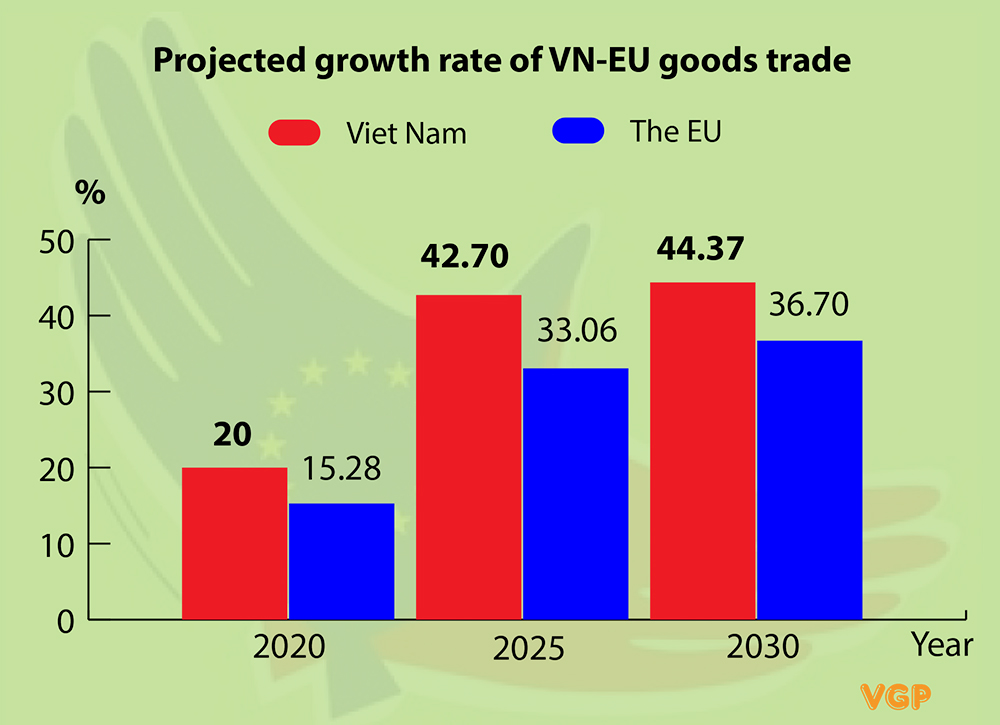Significance of “new-generation” free trade agreements
VGP – Viet Nam has signed 12 free trade agreements with external partners so far, of which the Viet Nam-EU free trade agreement (EVFTA) and the comprehensive and progressive agreement for trans-pacific partnership (CPTPP) are the “new-generation” deals with higher and broader commitments.
 |
|
Viet Nam’s export volume to the EU is projected to increase by 20% by 2020; 42.75 by 2025; and 44.37% by 2030 |
Viet Nam is among 11 nations that signed the CPTPP and the 7th member country to ratify the trade pact on November 12, 2018.
Meanwhile, Viet Nam is the second Southeast Asian country to ink the EVFTA and the Investment Protection Agreement (EVIPA) on June 30.
Definitely, the two trade agreements provide great opportunities for Viet Nam to expand exports to its nearly 30 partners in Asia, Europe and Latin America.
The Government estimated that the CPTPP, which took effect since January 14, 2019, will help increase Viet Nam’s GDP by 1.3% and export value by 4% by 2035.
Regarding the EVFTA, once it takes effect, the EU will immediately eliminate 85.6% of its all import duties and 99.2% after seven years. This is the highest commitment by foreign partner so far.
The EVFTA will is expected to help increase Viet Nam’s GDP by 2.18-3.25% in the 2019-2023 period, and 4.57%-5.03% in the following five years.
The Vietnamese Ministry of Planning and Investment estimated that Viet Nam’s exports to the EU is projected to grow by 20% by 2020; 42.75 by 2025; and 44.37% by 2030.
Beyond economic benefits, the EVFTA and CPTPP are also expected to stimulate the Government’s on-going institutional reform agenda in the context of extensive international integration in which economic integration is the core.
Institutional reform, especially administrative procedures reform, is currently one of the top priorities of the Government with an aim to building up an increasingly transparent and open environment for local and foreign investors. Both the CPTPP and the EVFTA is a real test of the country’s determination to pursue that process.
Ngo Chung Khanh, Deputy head of the Ministry of Industry and Trade’s Department of Multilateral Trade, once said the CPTPP is becoming an ‘internal-combustion engine’ for improving the quality of administrative procedures, ensuring equal access to all resources by businesses from all economic sectors, and eradicating market barriers in service and investment domains.
Khanh compared the significance of the agreement approval with Viet Nam’s official admission to the World Trade Organization as both created great turning points for the economy.
Vu Tien Loc, Chairman of the Viet Nam Chamber of Commerce and Industry said the signing of the EVFTA in Ha Noi this week reflects the Government’s determination to work towards “higher value-added economy”.
The trade deal can ben seen as an expressway to connect Viet Nam with one of the world’s top economic and technological centers.
The EU is an ideal market for businesses operating in Viet Nam to step up the added values of their exports and will help improve the quality of foreign investment in the Southeast Asian country. Loc said.
In addition, the “new-generation” agreements demonstrate Viet Nam’s consistent policy to support an open multilateral trading system as well as its consistent resolve to boost extensive and intensive international integration progress.
By Huong Giang
